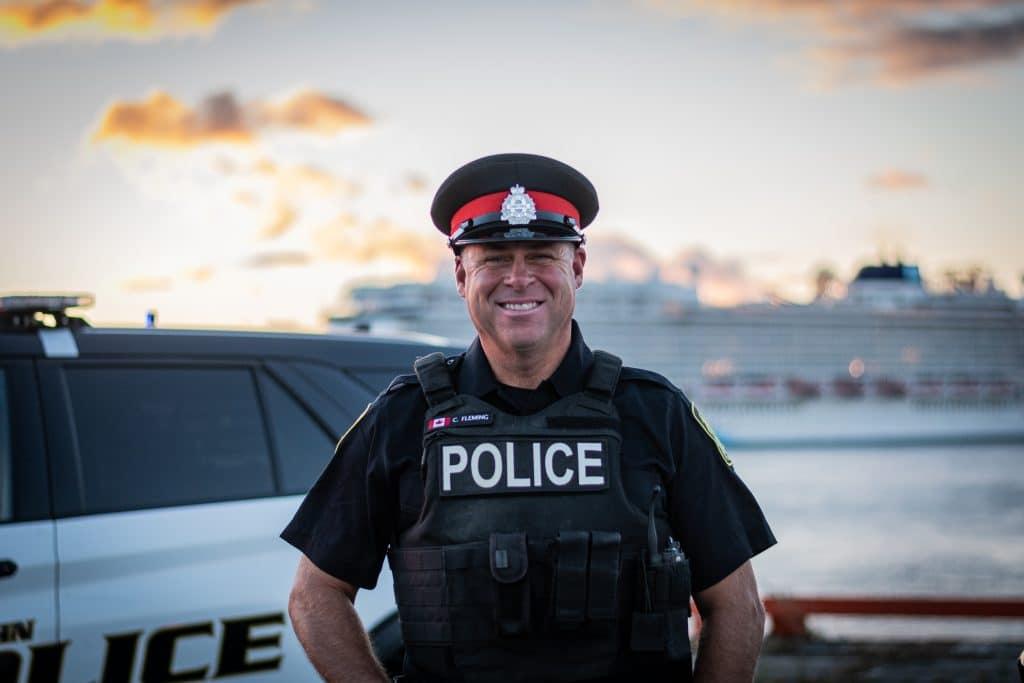If you are experiencing or witnessing an emergency, call 911 immediately.
If your situation is not an emergency but requires police assistance, contact the Saint John Police Department at their non-emergency number, (506) 648-3333, or call the police department in your community.

The police in New Brunswick
The Royal Canadian Mounted Police (RCMP) are often called “Mounties”—they are Canada’s national police force. RCMP are the main police force in rural areas in New Brunswick. In larger communities, there is also a local, municipal police force. In Saint John, there is the Saint John Police Force. Often, the RCMP will work with the local police force.
There is never a time when you would be expected to pay a police officer directly. If you get a ticket, you would pay it at your municipality directly or online. Offering a police offer money could be seen as a bribe, which is a serious crime in Canada.
What police do and how they help
Police officers’ job is to maintain order and public safety, and enforce laws and regulations. They respond to emergency calls, patrol public areas, regulate traffic, control crowds, investigate crimes and accidents, arrest offenders, and build community relationships. A police officer is allowed to engage in casual conversation with citizens and to ask questions.
Police work to make sure Canadians obey the law, but they also help citizens in many ways. If you are hurt, in trouble, or if simply need directions, a police officer can help you. Many Canadians teach their children to go to a police officer if they are lost.
In Canada, the rights of all people are protected by the Canadian Charter of Rights and Freedoms. Basic Human Rights are protected under law and all police officers are obligated to follow this Charter when dealing with anyone that is being arrested.
Police on the road
If you drive, you may have more interactions with the police than people who don’t drive. This is because it is the job of the police to help keep our roads safe by enforcing the rules of the road.
Sometimes, police carry out highway spot checks to make sure that motorists have a proper licence, registration and insurance, are driving with a seatbelt, and are not impaired. If an officer is driving behind you with their car’s flashing lights on, safely pull over to the side as soon as possible. Stay in your car. Do not get out and walk toward the police officer. Wait for the police officer to come to you. You should roll down your car window and speak politely. The police officer will probably ask you for your driver’s licence, proof of insurance, and car registration. You are legally obliged to produce these.
If the officer suspects that you are under the influence of drugs or alcohol, the officer may ask you to take a roadside breathalyzer test. You may also be required to provide a bodily fluid sample at a police station. It is against the law to refuse any of these tests.
Impaired driving is a very serious criminal offence in Canada. The penalty is a minimum fine of $1,000 for a first offence; one month in jail for a second offence; and four months in jail for a third offence. Those with a blood alcohol concentration exceeding 0.08 per cent face a maximum life sentence if they cause death and a maximum 10-year sentence if they cause bodily harm. Impaired drivers also lose their driving privileges for a period of time, and can expect their car insurance premiums to increase significantly.
If you are arrested
All Canadians have certain rights that apply if you are arrested by the police:
- You have the right to remain silent. Remaining silent does not imply guilt or innocence on your part.
- The officer who arrests you must tell you their name and show you their badge number.
- The police officer must tell you why you are being arrested.
- The police officer must tell you that you have the right to talk with a lawyer of your choice, in private, before you speak to the police. If you do not have a lawyer, the police must tell you that you may use duty counsel (immediate free-of-charge legal advice) and legal aid (free-of-charge help for people who cannot afford a lawyer).
- The police must give you the telephone number of a legal aid duty counsel and let you call them.